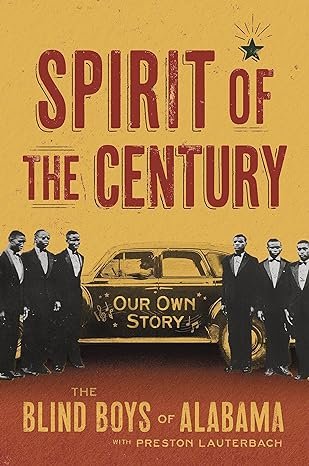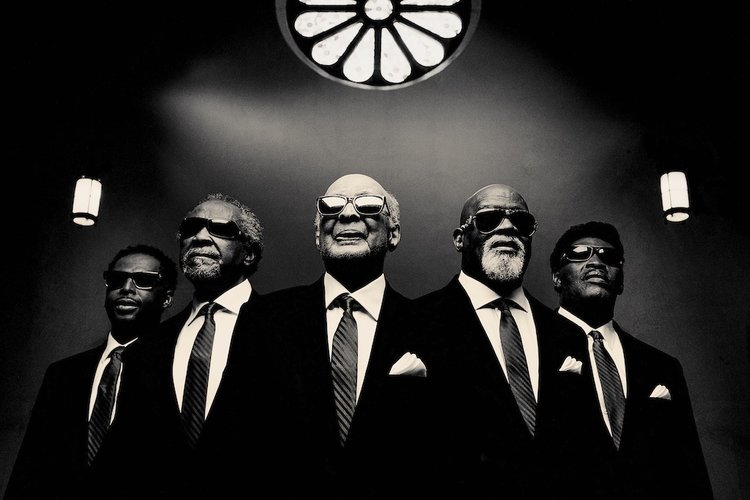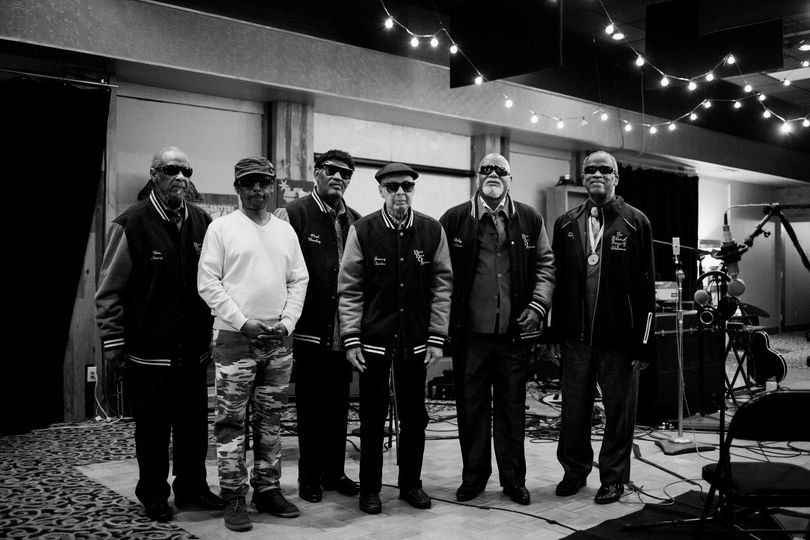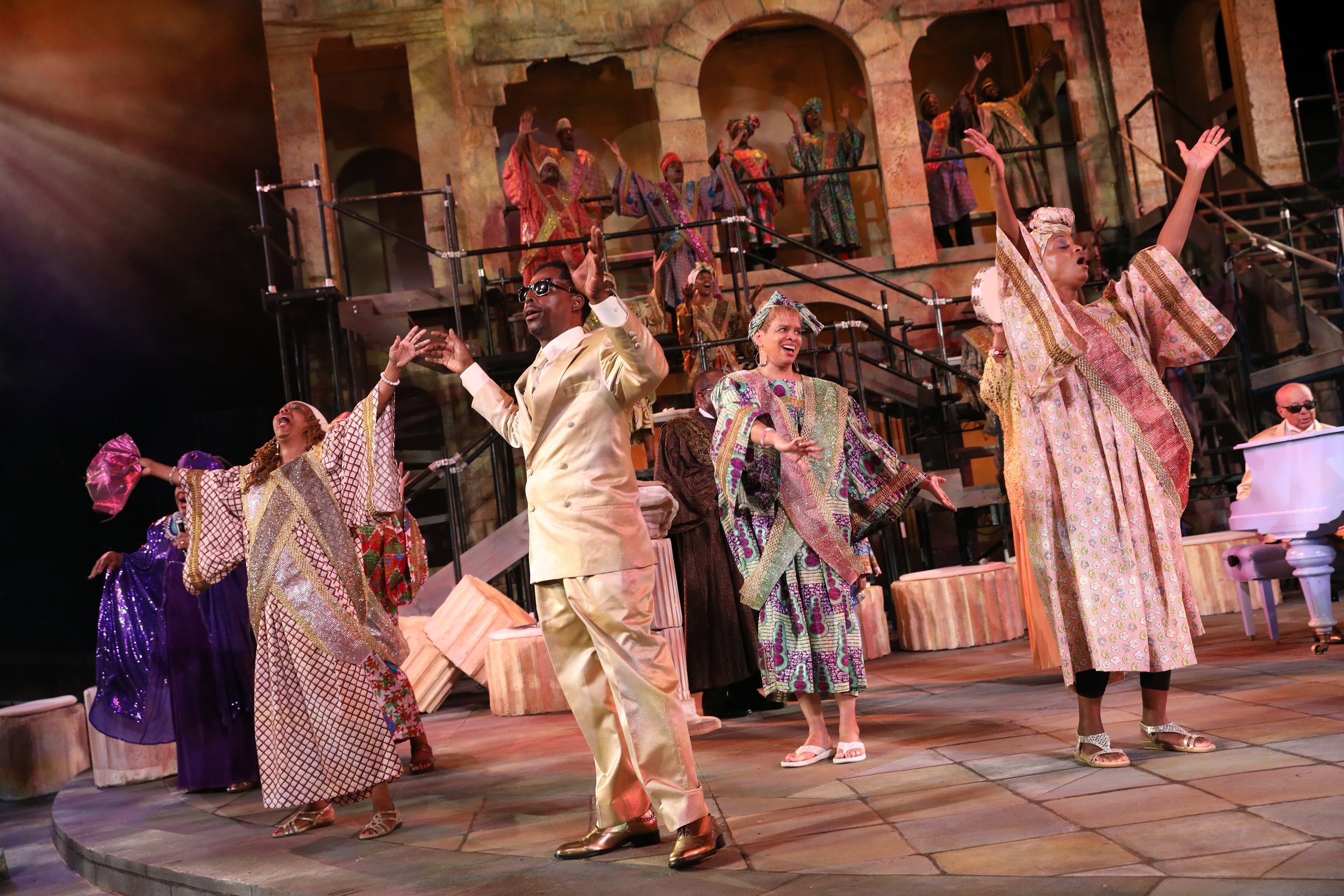‘Spirit of the Century: Our Own Story’ by The Blind Boys of Alabama with Preston Lauterbach
Photos courtesy of The Blind Boys of Alabama and the Public Theater
—Cathy Ritchie
Spirit of the Century: Our Own Story
by The Blind Boys of Alabama with Preston Lauterbach
Hachette Books, 2024
America may indeed be a “melting pot” and change agent, but when it comes to our nation’s musical heritage, gospel is one genre that has been revered and enjoyed in its original form since its creation in the 1800s. One performing group in particular has kept the purest brand of gospel alive and vibrant since the late 1930s, thus making themselves arguably the “longest-running musical institution in America.”
The Blind Boys of Alabama have survived almost a century of social, artistic, and financial challenges. The group’s fortunes have shifted with changing times and tides but they have never lost the loyalty of their core audiences, be they in small towns or major urban centers. Their commitment to spreading spiritual joy to listeners has never wavered.
Spirit of the Century: Our Own Story is billed as the Blind Boys’ “biography,” but it is unique. Though he is responsible for the book’s narrative, co-author Preston Lauterbach has partnered with innumerable Blind Boys, currently living or deceased, in telling the group’s story. He brings authorial richness, texture and even sardonic humor to the Boys’ multi-decade history, making the chronicle of their achievements a wholly entertaining read. And along the way, he also effectively situates the Blind Boys within the overall history of gospel music quartets. Lauterbach’s content is inherently fascinating, and his text should please both music specialists and general readers.
The Blind Boys of Alabama first came together in 1939 as part of the school chorus at the Alabama Institute for the Negro Deaf and Blind in Talladega, Alabama. They were originally called the Happy Land Jubilee Singers, and a 1944 radio broadcast was their first professional appearance. The Alabama singers were later co-promoted with a similar group who were known as the Blind Boys of Mississippi. The Alabama act soon became the “Blind Boys” as well, and they learned much from their counterparts about singing in “hard gospel” style, which had been forbidden in the Talladega school. The Boys’ first recording appeared in 1948; it included the group’s first national hit “I Can See Everybody’s Mother But Mine,” which in turn led to additional recordings on various labels.
Black gospel music was popular in the 1950s, and the Blind Boys rode that wave to success. Crossover artists at the time, Ray Charles and Sam Cooke among them, encouraged the Boys to broaden their appeal by integrating secular material into their act, but the singers were determined to stick to their gospel roots, a promise they have continued to keep.
As the 1960s dawned, gospel music’s appeal declined as rhythm and blues and rock began to dominate the airwaves. Once again, the Blind Boys were encouraged to become more secular, but they continued to resist, content to perform the music they knew best, while fully aware that their paychecks would thus be comparatively meager. Long-time members of the group came and went during the decade, including several who had been vital to the Boys’ initial success.
While the 1970s were a bleak time for the Boys, the 1980s finally brought them long-overdue national recognition. In 1983 the group was cast in the theatrical production The Gospel at Colonus, an African-American take on the Sophocles classic Oedipus at Colonus. The Blind Boys collectively portrayed the blinded Oedipus, co-starring with a fledgling actor named Morgan Freeman. The production won an Obie Award in 1984, moved to Broadway in 1988, and represented a turning point for the group.
In the decades following, the Blind Boys’ recognition skyrocketed, even as the group’s member lineup fluctuated. In the early 2000s they won several consecutive Grammy Awards in the “Traditional Soul Gospel” category, and began collaborating with other artists including Peter Gabriel, Tom Waits, Mavis Staples, Ben Harper and Lou Reed, while always embracing the traditional “hard gospel” approach to their music. They have also performed for multiple U.S. Presidents, including Barack Obama in 2010. The Blind Boys of Alabama are still telling their story, and spreading the good news, while joyously sharing their musical selves.
Author Lauterbach takes readers through the Boys’ eventful saga, warts and all, sharing reflections from current and past members that bring the group’s journey to life. He also focuses on three performers who he dubs the Boys’ “holy trinity”: Clarence Fountain, Jimmy Lee Carter, and George Scott, who added exceptional singing and outgoing personalities to the mix. Lauterbach skillfully blends their individual stories within the broad Blind Boys canvas.
Fortunately, Blind Boys audio and video “product” abounds, including a tsunami of albums, many featuring the “trinity”—and all are available on CD or online. Footage of their Colonus performance is available thanks to a PBS recorded broadcast. Their first appearances may have been limited to churches and school auditoriums, but the Blind Boys belong to the world now, which continues to welcome them with gratitude and joy.
Spirit of the Century is a fine introduction to an amazing group of dedicated men of music, and we can thank author Lauterbach for his sterling efforts.



